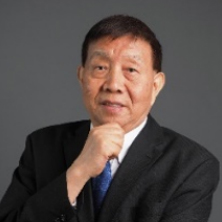
Tong-Yi Zhang
Professor
Member of Chinese Academy of Sciences
Hong Kong University of Science and Technology (Guangzhou), China
Biography: Prof. Tong-Yi Zhang is the founding dean of Materials Genome Institute, Shanghai University, and the founding director of the Materials Genome Engineering division in the Chinese Materials Research Society (CMRS). Currently he is doing his best to propomote Materials Genome Engineering, Materials/Mechanics Informatics, and AI4S and AI4materials, especially, materials AI labs and materials AI computations. He joined the Hong Kong University of Science and Technology (Guangzhou) in 2022. He is the founding Editor-in-Chief of Journal of Materials Informatics and was the Editor-in-Chief of Science China Technological Sciences 2018-2022. He received the awards including the 2018 Prize for Scientific and Technological Progress from the HLHL Foundation, the Second Prizes of 2007 and 1987 State Natural Science Award, China, and the 1988 National Award for Young Scientists, China. He became Fellow of International Congress on Fracture in 2013, Fellow of the Hong Kong Academy of Engineering Sciences in 2012, Member of Chinese Academy of Sciences in 2011, Senior Research Fellow of Croucher Foundation, Hong Kong, in 2003, Fellow of ASM International, USA, in 2001. Plenary Lecture: AI for Science (AI4S) - AI for Structural Integrity
Invited Lecture: AI for Science (AI4S) - AI for Structural Integrity
Abstract: This presentation briefly introduces the concept of Materials/Mechanics Informatics and Materials/Mechanics-GPT. Materials/Mechanics informatics is growing extremely fast by integrating Artificial Intelligence (AI) and machine learning with materials/mechanics science and engineering to accelerate materials/mechanics science, engineering and manufacturing innovations. Particularly, the launch of ChatGPT-4 further pours oil on the flames of Materials/Mechanics Informatics and hastens the parturition of Materials/Mechanics-GPT, which will result in materials/mechanics large multimodal models. Materials/Mechanics-GPT are built up based on two foundations, which are the “hard” foundation of materials/mechanics AI laboratories and the “soft” foundation of AI materials/mechanics computations and software. Both the “hard” and “soft” foundations must be very strong and developed under the guidance of domain knowledge. The domain knowledge-guided machine learning strategy is the best way to create new knowledge, innovate and progress materials/mechanics science and engineering, and accelerate the materials/mechanics manufacturing. Case studies presented here are concentrated on the integration of AI with structural integrity. The showcases include the domain knowledge-guided statistic learning of small data of sample size- and pre-notch length- dependent strength of concrete and the forecasting Li-ion battery charging/discharge fatigue life. This strategy of integrating AI with structural integrity will definitely accelerate the development of structural integrity with much more powerful tools in the whole respects of its science and technology, especially its engineering practice.


